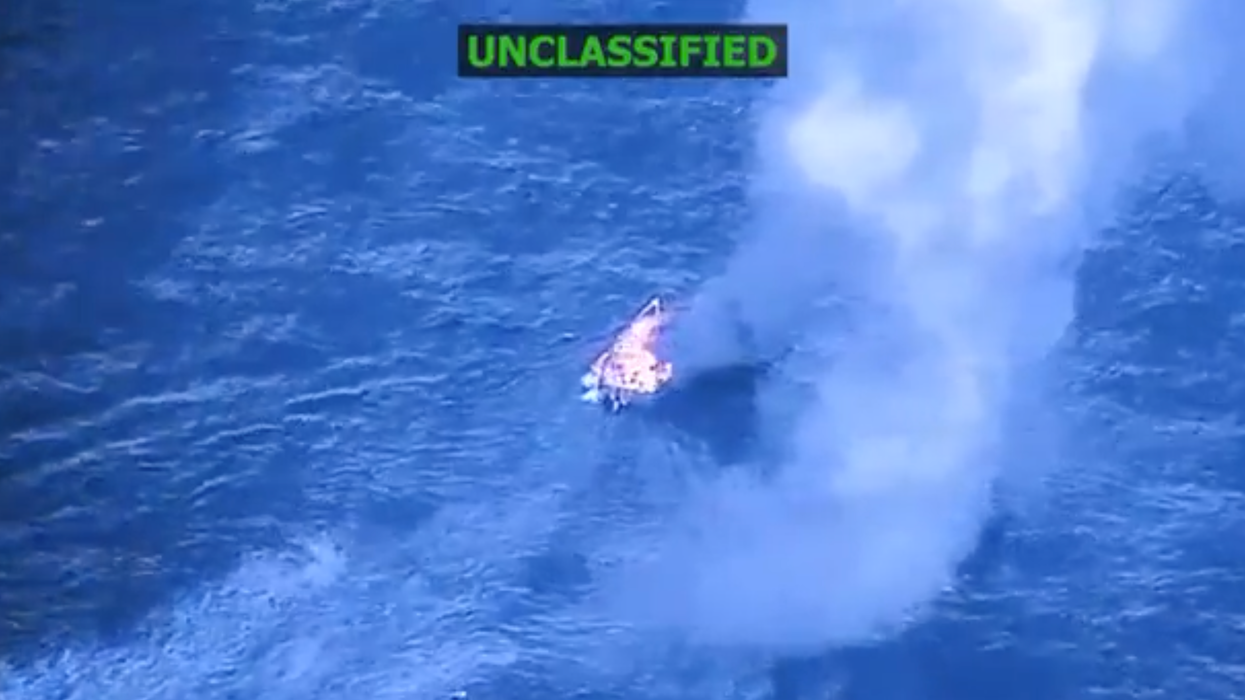April, 19 2016, 12:15pm EDT
For Immediate Release
Contact:
Kelly Trout, Chesapeake Climate Action Network, 240-396-2022 (office), kelly@chesapeakeclimate.org
Kathleen Scatassa, Earthjustice, 212-845-7380 (office) kscatassa@earthjustice.org
D.C. Circuit Court Hears Environmental Challenge to Feds' Approval of Cove Point Gas Export Facility in Maryland
Groups argue that FERC illegally overlooked harm from expanded fracking, explosion risks, and tanker traffic in the Chesapeake Bay
WASHINGTON
Environmental groups faced off with the Federal Energy Regulatory Commission (FERC) before the D.C. Circuit Court of Appeals today, arguing that the agency illegally overlooked significant pollution and human safety risks in approving a massive liquefied natural gas (LNG) export terminal along the Chesapeake Bay in southern Maryland.
The $3.8 billion Cove Point facility was approved in October 2014 and is currently under construction by Cove Point LNG, LP, a subsidiary of Dominion Resources. It would be the first LNG export terminal on the East Coast and, the groups argue, would play a major role in expanding harmful fracking operations across the Mid-Atlantic region.
Earthjustice filed the lawsuit (Case No. 15-1127) in May 2015 on behalf of the Chesapeake Climate Action Network, Patuxent Riverkeeper, and the Sierra Club, after FERC ended nearly seven months of delay and officially denied the groups' request for a rehearing. The case is part of a steady line of lawsuits challenging FERC for facilitating a massive expansion of gas export infrastructure and pipelines without fully accounting for the public and environmental harms.
"FERC once again shirked its duty under federal environmental law, and the result could be a disaster for both the climate and communities scarred by fracking wells and pipelines," said Deborah Goldberg, managing attorney at Earthjustice, who presented oral arguments to the court today. "We are asking the court to require that FERC go back to the drawing board and fully evaluate the many ways in which this project will degrade the environment."
Specifically, the petitioners are asking the federal court to require FERC to prepare a more rigorous Environmental Impact Statement, and to order Dominion to halt construction in the meantime.
The groups contend that FERC circumvented the National Environmental Policy Act by failing to credibly consider the significant new amounts of air, water, and climate pollution that would be triggered by expanded fracking and fracked-gas infrastructure "upstream" of the Cove Point facility. Dominion is permitted to export nearly one billion cubic feet of gas per day. Analysis indicates that, accounting for emissions triggered across the lifecycle of fracking, piping, liquefying, shipping and burning the gas, the Cove Point terminal could cause more greenhouse gas pollution than all eight of Maryland's coal-fired power plants combined.
"It defies logic and the law for FERC to claim that it can't determine whether exporting massive new amounts of gas will involve new fracking, or new emissions of heat-trapping methane," said Anne Havemann, general counsel at the Chesapeake Climate Action Network. "Based on a shoddy environmental review, FERC has already subjected residents of Calvert County to irreparable harm. We look to the court to step in before an ounce of gas is exported, causing even more harm to our climate and worsening record heat, storms, sea-level rise, and flooding."
"The stated purpose of this and other export terminals is to provide a market for increased gas production," said Nathan Matthews, staff attorney at Sierra Club, who is litigating Sierra Club's challenges to other LNG export approvals. "Exports plainly mean more drilling, more fracking, and more climate-disrupting pollution, but FERC has consistently refused to consider any of these impacts."
The groups' legal petition further cites FERC's failure to adequately address the safety threats to nearby residents in Lusby, Maryland--where the liquefaction plant would be built in closer proximity to residences than any other facility previously approved by FERC. Additionally, the groups contend that FERC did not thoroughly consider how foreign tanker ships discharging dirty ballast water will harm the water quality of the Chesapeake Bay or how an increase in tanker traffic could threaten the critically endangered North Atlantic Right Whale.
Lawyers for Dominion and the American Petroleum Institute joined FERC in court today to defend the agency's limited environmental review.
The D.C. Circuit has previously heard challenges by Sierra Club and Galveston Baykeeper to FERC's approval of LNG export facilities at Sabine Pass, Louisiana, and Freeport, Texas, but has yet to rule in those cases. Sierra Club has also challenged FERC's approval of the Corpus Christi, Texas, LNG export facility. That case is fully briefed, but has not yet been set for oral argument.
FOR MORE INFORMATION:
- View the petitioners' joint brief in the case: https://chesapeakeclimate.org/wp/wp-content/uploads/2016/04/Environmental-petitioners-Cove-Point-final-brief-2016-2-24.pdf
- View the petitioners' joint reply brief to FERC: https://chesapeakeclimate.org/wp/wp-content/uploads/2016/04/Environmental-petitioners-Cove-Point-final-reply-brief-2016-2-24.pdf
- View the groups' petition filed on May 7, 2015: https://chesapeakeclimate.org/wp/wp-content/uploads/2015/05/Cove-Point-Petition-for-Review-as-Filed-2015-05-07.pdf
The Chesapeake Climate Action Network (CCAN) is the first grassroots, nonprofit organization dedicated exclusively to fighting global warming in Maryland, Virginia, and Washington, D.C. Our mission is to build and mobilize a powerful grassroots movement in this unique region that surrounds our nation's capital to call for state, national and international policies that will put us on a path to climate stability. - See more at: https://www.chesapeakeclimate.org/index.php?option=com_k2&view;=itemlist&...
LATEST NEWS
'This Is an Act of War': CIA Carried Out Drone Strike on Port Facility Inside Venezuela
One expert called the reported drone strike a "violation of Article 2(4) of the UN Charter and the Take Care Clause of the Constitution."
Dec 30, 2025
The US Central Intelligence Agency reportedly carried out a drone strike earlier this month on a port facility inside Venezuela, marking the first time the Trump administration launched an attack within the South American country amid a broader military campaign that observers fear could lead to war.
CNN on Monday was first to report the details of the CIA drone strike, days after President Donald Trump suggested in a radio interview that the US recently took out a "big facility" in Venezuela, prompting confusion and alarm. Trump authorized covert CIA action against Venezuela in October.
According to CNN, which cited unnamed sources, the drone strike "targeted a remote dock on the Venezuelan coast that the US government believed was being used by the Venezuelan gang Tren de Aragua to store drugs and move them onto boats for onward shipping."
To date, the Trump administration has not provided any evidence to support its claim that boats it has illegally bombed in international waters were involved in drug trafficking. No casualties were reported from the drone strike, and the Venezuelan government has not publicly commented on the attack.
"This is an act of war and illegal under both US and international law, let’s just be clear about that," journalist Mehdi Hasan wrote in response to news of the drone strike.
Brian Finucane, senior adviser with the US Program at the International Crisis Group, called the reported drone attack a "violation of Article 2(4) of the UN Charter and the Take Care Clause of the Constitution."
"Seemingly conducted as covert action and then casually disclosed by POTUS while calling into a radio show," he added.
CNN's reporting, later corroborated by the New York Times, came after the Trump administration launched its 30th strike on a vessel in international waters, bringing the death toll from the lawless military campaign to at least 107.
The Times reported late Monday that "it is not clear" if the drone used in last week's mission "was owned by the CIA or borrowed from the US military."
"The Pentagon has stationed several MQ-9 Reaper drones, which carry Hellfire missiles, at bases in Puerto Rico as part of the pressure campaign," the Times added.
Keep ReadingShow Less
30th Strike in Trump's High-Seas Kill Spree Claims 2 More Lives
At least 107 people have been killed in US bombings of boats that the Trump administration claims—without evidence—were involved in narco-trafficking in the Caribbean Sea and Pacific Ocean.
Dec 29, 2025
The US military said Monday that two alleged drug smugglers were killed in the bombing of another boat in the eastern Pacific Ocean, but—as has been the case throughout 30 such strikes—offered no verifiable evidence to support its claim.
US Southern Command (SOUTHCOM) said on X that, on orders from Defense Secretary Pete Hegseth, "Joint Task Force Southern Spear conducted a lethal kinetic strike on a vessel operated by Designated Terrorist Organizations in international waters."
"Intelligence confirmed the vessel was transiting along known narco-trafficking routes in the eastern Pacific and was engaged in narco-trafficking operations," SOUTHCOM added. "Two male narco-terrorists were killed. No US military forces were harmed."
According to the Trump administration's figures, at least 107 people have been killed in 30 boat strikes since early September. The administration has tried to justify the strikes to Congress by claiming that the US is in an “armed conflict” with drug cartels, while legal scholars and Democratic US lawmakers counter that the bombings are likely war crimes.
War powers resolutions aimed at reining in President Donald Trump’s ability to extrajudicially execute alleged drug traffickers in or near Venezuela failed to pass the Senate in October and the House earlier this month.
Monday's strike came amid Trump's escalating aggression against Venezuela, including the deployment of warships and thousands of US troops to the region, authorization of covert CIA operations targeting the country's socialist government, and threats to launch ground attacks.
Trump claimed Monday without providing evidence that US forces destroyed a "big facility" in an unspecified country where narco-traffickers' "ships come from."
Keep ReadingShow Less
Trump Bemoans Not Winning Nobel Peace Prize During Netanyahu Hot Mic
The self-described "most anti-war president in history" has ordered the bombing of at least nine nations—more than any US leader in history—and has been indispensable to Israel's genocide in Gaza.
Dec 29, 2025
President Donald Trump—who has bombed more countries than any US leader in history—once again lamented what he considers his snub for the Nobel Peace Prize during a Monday meeting with fugitive Israeli Prime Minister Benjamin Netanyahu.
In an apparent hot mic moment, Trump, seemingly unaware that there were reporters in the room, speaks to Netanyahu and other Israeli and US officials gathered at the president's Mar-a-Lago club in Florida about the "35 years of fighting" between two unspecified countries that he "stopped."
"Do I get credit for it? No," Trump says, adding before being interrupted by Netanyahu, "They gave the Nob..."
As something of a consolation prize, Netanyahu said Monday that he's awarding Trump with the Israel Prize, that nation's highest cultural honor. Trump will be the first foreign leader to receive the award.
Football's global governing body also gave Trump its inaugural—and widely derided—FIFA Peace Prize earlier this month in recognition of the administration's role in brokering an end to international conflicts.
"I did eight of them," Trump said during the hot mic—likely referring to the number of wars he falsely claims to have ended—before seeming to notice the journalists and changing the subject.
Trump ranting to Netanyahu on a hot mic: "Do I get credit for it? No. They gave the Nob-- I did 8 of them. How about India and Pakistan? So I did 8 of them. And then I'll tell you the rest of it."
[image or embed]
— Aaron Rupar (@atrupar.com) December 29, 2025 at 10:57 AM
Trump did nine of them—as in the number of countries he's bombed, breaking former President Barack Obama's record of seven. Over the course of his two terms, Trump has ordered the bombing of Afghanistan, Iran, Iraq, Libya, Nigeria, Pakistan, Somalia, Syria, and Yemen, as well as boats allegedly transporting drugs in the Caribbean Sea and Pacific Ocean.
Thousands of civilians have been killed or wounded during these campaigns, according to experts.
Trump has recently deployed warships and thousands of US troops near Venezuela, which could become the next country attacked by a the self-described "the most anti-war president in history."
The US president has also backed Israel's genocidal war on Gaza, which has left more than 250,000 Palestinians dead, maimed, or missing, and around 2 million others forcibly displaced, starved, or sickened. Israel's conduct in the war is the subject of an ongoing International Court of Justice genocide case filed by South Africa.
Meanwhile, Netanyahu and his former defense minister Yoav Gallant are wanted by the International Criminal Court for alleged war crimes and crimes against humanity in Gaza, including murder and forced starvation.
“He is a wartime prime minister. He’s done a phenomenal job," Trump said while standing with Netanyahu later on Monday. "He’s taken Israel through a very dangerous period of trauma."
He is also accused of prolonging the Gaza war to forestall a reckoning in his domestic corruption trial, in which Trump has intervened by requesting a pardon.
“Israel, with other people, might not exist right now," Trump added. "If you had the wrong prime minister, Israel right now would not exist.”
Keep ReadingShow Less
Most Popular


